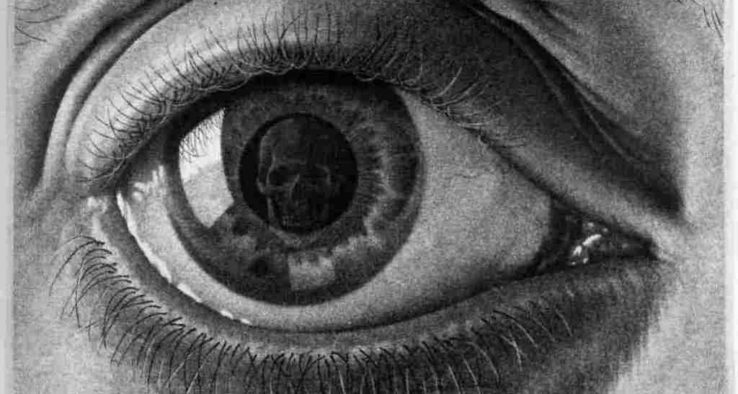Semyon, a close relative of my family has passed away about a month ago. There was nothing surprising about it – the man has suffered from a terminal lung cancer for over an year. But when I heard the news, I still couldn’t help but feel a sense of shock.
Man’s death can never leave us indifferent. Death of unnamed and faceless thousands is grasped rationally, not emotionally. Death of a stranger, of who’s life and death we learn in the same sentence in the newspaper may stir some sadness, especially if the circumstances of his life and death were tragic. But death of man we knew about, whose life was real to us, whose bad habits and lousy temperament were inseparable from the world he lived in – such death is always shocking. It is shocking not because of the loss – it takes time to acknowledge it. It is shocking because we are suddenly reminded of the reality of death.
We don’t usually think or talk about death, at least not seriously. Death is one of the last taboos of western society. But once in a while, when we are reminded of it’s impending reality, we may ask ourselves “is there a preferred way to go”?
A Painful Decay
The last year of Semyon’s life was difficult for him and his family. He suffered from unending coughing, excruciating pain, difficulty to move. It was very hard for his wife and children – having to witness your husband’s, father’s consumption by a disease is a heart-breaking experience. But amidst the pain and the anguish, there were also moments of reflection and reconciliation. His son told us later that in the last months of his life he was occupied by thoughts about his mother. It was his wish to be buried next to her.
We are born crying, we pass away suffering. But sometimes the suffering is so long and hard, that death is wished for, waited for, to come and liberate. When old age or illness bring physical and mental degradation, loss of human dignity, severe personality changes, the resulting toll on the person and (even more so) on his family is almost unbearable. That’s not the way we want to be remembered, that’s not a way to die.
But a long and protracted battle with a debilitating disease, carried with dignity and courage, can be a source of inspiration. After all, if a dying person can be so noble, maybe I can show a little bit more responsibility in my life?
A Violent Vanishing
A long battle with death is painful for everybody involved. Does it mean that we should prefer a momentary, sudden death? It’s easy to argue that for the person dying, sudden, momentary death is preferable. Heart stroke in your sleep, and ten seconds later you are gone. But a more careful consideration undermines this view.
The family of the suddenly deceased is struck with shock and grief, and consolations like “at least he didn’t suffer” hardly make it any easier for them. Since nothing prepares them for the tragedy, the initial shock is magnified by the absurdity and unrealism of the situation. You hear friends saying “just yesterday we talked about going to cinema on the weekend…and now he is gone. How can it be?”
When the first shock is over, and grief sets over, it is made worse by feelings of guilt and regret. Never having the chance to express love one last time, to say goodbye, to ask for forgiveness, the loved ones of the deceased fixate on their last bitter exchange, their ungrateful behavior, their indifferent selfishness. It’s much harder to come to terms with the tragedy, when sorrow is reinforced with guilt
But what about the person itself? Doesn’t he deserve a chance to say goodbye, to say how sorry he is? Forever denied the opportunity for retrospect, for reconciliation, for one last life struggle and achievement – the acceptance of approaching death, the story of his life is never finished – it’s abruptly terminated. If ghosts ever existed, these must be the ghosts of the suddenly deceased.
A Peaceful Goodbye
A long battle with the death is too painful. Sudden, momentary death is too absurd. Is there a “better” alternative? This is how I picture a “perfect death”:
One morning you get a phone call from your physician: turns out you are terminally ill, and in three months time it will be over. He ensures you that there is absolutely no hope (saving you wasting time on futile fight), and that the medication you’ll get is very effective in managing pain, so that your suffering will be minimal.
It takes you a couple of weeks for the news to sink in. Gradually, self-pity makes place for a sense of urgency: there are some things you need to do before you are ready to check in: loose ends to be tied, words to be said, amends to be made.
When the times comes, you are ready. Regrets for unfulfilled plans and dreams are outweighed by a sense of completion. Achieving a closure in your life, you are almost peaceful. You are afraid, but you are not in panic. Your last thought amuses you: “I hope my atheism won’t be judged too harshly when I face Him”.
Wishing us a long, fulfilling life and a dignified death.



The challenge of this post is to actually start living that way now.
Say the things that need to be said, today.
Forgive today.
Love, laugh, cry, and mourn today, for you do not know what tomorrow brings.
I think death can also be taken as a metaphor for any type of crises. If approaching death can transform people (for the good), so does job termination, death of close people, sickness.
If we can take this suffering, and let it drive us to a change – than maybe we can find meaning even in the worst of circumstances.
The challenge of this post is to actually start living that way now.
Say the things that need to be said, today.
Forgive today.
Love, laugh, cry, and mourn today, for you do not know what tomorrow brings.
I think death can also be taken as a metaphor for any type of crises. If approaching death can transform people (for the good), so does job termination, death of close people, sickness.
If we can take this suffering, and let it drive us to a change – than maybe we can find meaning even in the worst of circumstances.
Thank you for commenting on my blog post.
I agree, that the long, drawn out march towards the end is a difficult one to witness and I would imagine very difficult to be the one to endure it. One thing you didn’t mention was the financial burden of the long, drawn out death. As interventions are employed to extend life or palliate the pain, these financial costs inevitably soar.
But, that being said…
I’ve watched one of my dear colleagues lose to her second round of breast cancer, and witnessed a replay of this scenario as my 7 year old daughter’s former teacher lost her battle with cancer.
I was struck by a few things: how positive the teacher was in spite of the fact she knew there were no more treatment options available to her (she battled recurrent ovarian cancer far longer than was anticipated she would be able to); how “blessed” my daughter was to have formed a close relationship with that teacher; and how my experiences with my colleague helped me be sensitive to my own daughter’s needs.
Once I heard that the treatments would be discontinued, I made certain to keep tabs on her progress and take steps to prepare my daughter for what was to come.
Rather than re-write the whole thing, you can read these two posts
http://raisingsmartgirls.wordpress.com/2009/11/10/my-grieving-child/
http://raisingsmartgirls.wordpress.com/2009/11/13/and-thats-how-i-want-to-be-remembered/
It’s still difficult for me at times, though my daughter is completely okay now with it. We had a tree dedication for Mrs. P about a week ago. My husband and I were moved by it as we listened to her husband give a small speech.
But…even though I’m not dying, long ago I’d already made efforts to appreciate to a great many people in my life and resolve some of my own issues with others.
This year, one of the biggest ones revolves around my father, who my mother divorced when I was 2. I’m bringing my daughters to see my dad – someone I haven’t seen in 29 years (I’ll be 40 in the summer), due to my mom’s interference and distance (he lives many states away). I anticipate there will be lots of tears and lots of resolution of old hurts.
My dad has a very slow growing cancer chronic lymphocytic leukemia. He’s had a number of other health problems. We’ve restored a lot of our relationship via the phone in the past 6 or so years, but this trip will help both of us in many ways, I think. Plus, he gets to see three of his grandchildren too.
In my humble opinion, we should be making efforts to resolve old hurts and amending wrongs regardless of impending death.
But failing that, then yes, that 3 month window would at least be something to manage that without dragging the process on.
Thanks for the thoughtful post.
Casey
Thank you for commenting on my blog post.
I agree, that the long, drawn out march towards the end is a difficult one to witness and I would imagine very difficult to be the one to endure it. One thing you didn’t mention was the financial burden of the long, drawn out death. As interventions are employed to extend life or palliate the pain, these financial costs inevitably soar.
But, that being said…
I’ve watched one of my dear colleagues lose to her second round of breast cancer, and witnessed a replay of this scenario as my 7 year old daughter’s former teacher lost her battle with cancer.
I was struck by a few things: how positive the teacher was in spite of the fact she knew there were no more treatment options available to her (she battled recurrent ovarian cancer far longer than was anticipated she would be able to); how “blessed” my daughter was to have formed a close relationship with that teacher; and how my experiences with my colleague helped me be sensitive to my own daughter’s needs.
Once I heard that the treatments would be discontinued, I made certain to keep tabs on her progress and take steps to prepare my daughter for what was to come.
Rather than re-write the whole thing, you can read these two posts
http://raisingsmartgirls.wordpress.com/2009/11/10/my-grieving-child/
http://raisingsmartgirls.wordpress.com/2009/11/13/and-thats-how-i-want-to-be-remembered/
It’s still difficult for me at times, though my daughter is completely okay now with it. We had a tree dedication for Mrs. P about a week ago. My husband and I were moved by it as we listened to her husband give a small speech.
But…even though I’m not dying, long ago I’d already made efforts to appreciate to a great many people in my life and resolve some of my own issues with others.
This year, one of the biggest ones revolves around my father, who my mother divorced when I was 2. I’m bringing my daughters to see my dad – someone I haven’t seen in 29 years (I’ll be 40 in the summer), due to my mom’s interference and distance (he lives many states away). I anticipate there will be lots of tears and lots of resolution of old hurts.
My dad has a very slow growing cancer chronic lymphocytic leukemia. He’s had a number of other health problems. We’ve restored a lot of our relationship via the phone in the past 6 or so years, but this trip will help both of us in many ways, I think. Plus, he gets to see three of his grandchildren too.
In my humble opinion, we should be making efforts to resolve old hurts and amending wrongs regardless of impending death.
But failing that, then yes, that 3 month window would at least be something to manage that without dragging the process on.
Thanks for the thoughtful post.
Casey
In my opinion most of the time the way you died doesn’t change the way you lived.. though of course if you’re lucky some very important things can be done if you have a little time for it, if you have time to complete some things if they are to be completed, I know some people may totally transform going through ‘knowing coming death’ experience. But in real life i’ve never seen that and i hope people will remeber me from the way i lived.. cause dying may be too difficult test to pass it ‘nobly’.. i dont’ know.. So i can only join the previous responce that we better live fully today not to have much to regret later.. We’re reminded of that every time we’re loosing someone in our lifes.
Oxanna, thank you for your sincerity.
It was with a heavy heart that I wrote about the nobility of approaching death carried with dignity. And that is because behind this pretty heroic picture, hides a lot of meaningless suffering, despair, hopelessness, dirt.
Your words about the test of death being too difficult to pass, pierced me right through. It all looks good on paper, but the reality of death is so grim and painful, that any attempt to give it meaning is mostly wishful thinking.
Thank you for your wisdom.
In my opinion most of the time the way you died doesn’t change the way you lived.. though of course if you’re lucky some very important things can be done if you have a little time for it, if you have time to complete some things if they are to be completed, I know some people may totally transform going through ‘knowing coming death’ experience. But in real life i’ve never seen that and i hope people will remeber me from the way i lived.. cause dying may be too difficult test to pass it ‘nobly’.. i dont’ know.. So i can only join the previous responce that we better live fully today not to have much to regret later.. We’re reminded of that every time we’re loosing someone in our lifes.
Oxanna, thank you for your sincerity.
It was with a heavy heart that I wrote about the nobility of approaching death carried with dignity. And that is because behind this pretty heroic picture, hides a lot of meaningless suffering, despair, hopelessness, dirt.
Your words about the test of death being too difficult to pass, pierced me right through. It all looks good on paper, but the reality of death is so grim and painful, that any attempt to give it meaning is mostly wishful thinking.
Thank you for your wisdom.
Watch this. The last lecture of Randy Pausch, with terminal cancer, one of a few talks he did while clearing the table.
Yeah, it’s a great lecture.
In on of my posts (https://mike.polischuk.net/2010/03/the-significance-of-meaning/) I have speculated that what motivated him to this lecture was man’s need to find meaning in his life, and assert that it was worthy. It wasn’t just about leaving a legacy to his children. It was also about him – about contemplating his life, tying it’s loose ends and coming to a closure.
And although the opportunity he had to share his life lessons didn’t make his death less tragic, it made it more meaningful.
Watch this. The last lecture of Randy Pausch, with terminal cancer, one of a few talks he did while clearing the table.
Yeah, it’s a great lecture.
In on of my posts (https://mike.polischuk.net/2010/03/the-significance-of-meaning/) I have speculated that what motivated him to this lecture was man’s need to find meaning in his life, and assert that it was worthy. It wasn’t just about leaving a legacy to his children. It was also about him – about contemplating his life, tying it’s loose ends and coming to a closure.
And although the opportunity he had to share his life lessons didn’t make his death less tragic, it made it more meaningful.
Life is short , even if it is long . There is always something more to be said or done . If I had to chose how to go I would choose to stay 🙂 .
Life is short , even if it is long . There is always something more to be said or done . If I had to chose how to go I would choose to stay 🙂 .
Test
Test2
That's true. But if we could stay, than the story of man wouldn't be so tragic, and so noble as a result.
Hi Mike,
This is a great post! I’m glad I finally opened my blog again and saw your comment – and thus the link to this article.
You are right. What you have described indeed makes for a great death scenario – a compromise between sudden death and a long, drawn-out death, one might say. One has enough time to prepare for his death, is given no false hopes, does not suffer (at least physically), and has the added consolation of knowing that his loved ones will have time to prepare themselves as well.